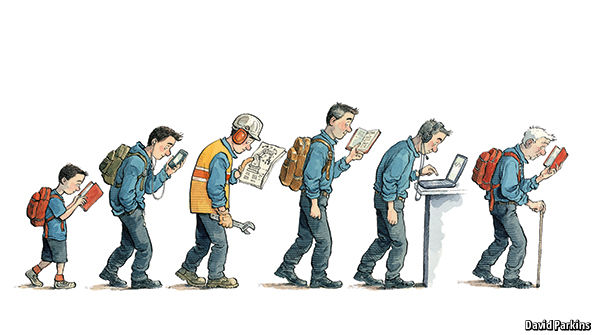Equipping people to stay ahead of technological change — from economist.com by
It is easy to say that people need to keep learning throughout their careers. The practicalities are daunting.
Excerpt (emphasis DSC):
WHEN education fails to keep pace with technology, the result is inequality. Without the skills to stay useful as innovations arrive, workers suffer—and if enough of them fall behind, society starts to fall apart. That fundamental insight seized reformers in the Industrial Revolution, heralding state-funded universal schooling. Later, automation in factories and offices called forth a surge in college graduates. The combination of education and innovation, spread over decades, led to a remarkable flowering of prosperity.
Today robotics and artificial intelligence call for another education revolution. This time, however, working lives are so lengthy and so fast-changing that simply cramming more schooling in at the start is not enough. People must also be able to acquire new skills throughout their careers.
Unfortunately, as our special report in this issue sets out, the lifelong learning that exists today mainly benefits high achievers—and is therefore more likely to exacerbate inequality than diminish it. If 21st-century economies are not to create a massive underclass, policymakers urgently need to work out how to help all their citizens learn while they earn. So far, their ambition has fallen pitifully short.
…
At the same time on-the-job training is shrinking. In America and Britain it has fallen by roughly half in the past two decades. Self-employment is spreading, leaving more people to take responsibility for their own skills. Taking time out later in life to pursue a formal qualification is an option, but it costs money and most colleges are geared towards youngsters.
The classic model of education—a burst at the start and top-ups through company training—is breaking down. One reason is the need for new, and constantly updated, skills.
Lifelong learning is becoming an economic imperative — from economist.com
Technological change demands stronger and more continuous connections between education and employment, says Andrew Palmer. The faint outlines of such a system are now emerging
Excerpt:
A college degree at the start of a working career does not answer the need for the continuous acquisition of new skills, especially as career spans are lengthening. Vocational training is good at giving people job-specific skills, but those, too, will need to be updated over and over again during a career lasting decades. “Germany is often lauded for its apprenticeships, but the economy has failed to adapt to the knowledge economy,” says Andreas Schleicher, head of the education directorate of the OECD, a club of mostly rich countries. “Vocational training has a role, but training someone early to do one thing all their lives is not the answer to lifelong learning.”
…
To remain competitive, and to give low- and high-skilled workers alike the best chance of success, economies need to offer training and career-focused education throughout people’s working lives. This special report will chart some of the efforts being made to connect education and employment in new ways, both by smoothing entry into the labour force and by enabling people to learn new skills throughout their careers. Many of these initiatives are still embryonic, but they offer a glimpse into the future and a guide to the problems raised by lifelong reskilling.
Individuals, too, increasingly seem to accept the need for continuous rebooting.









